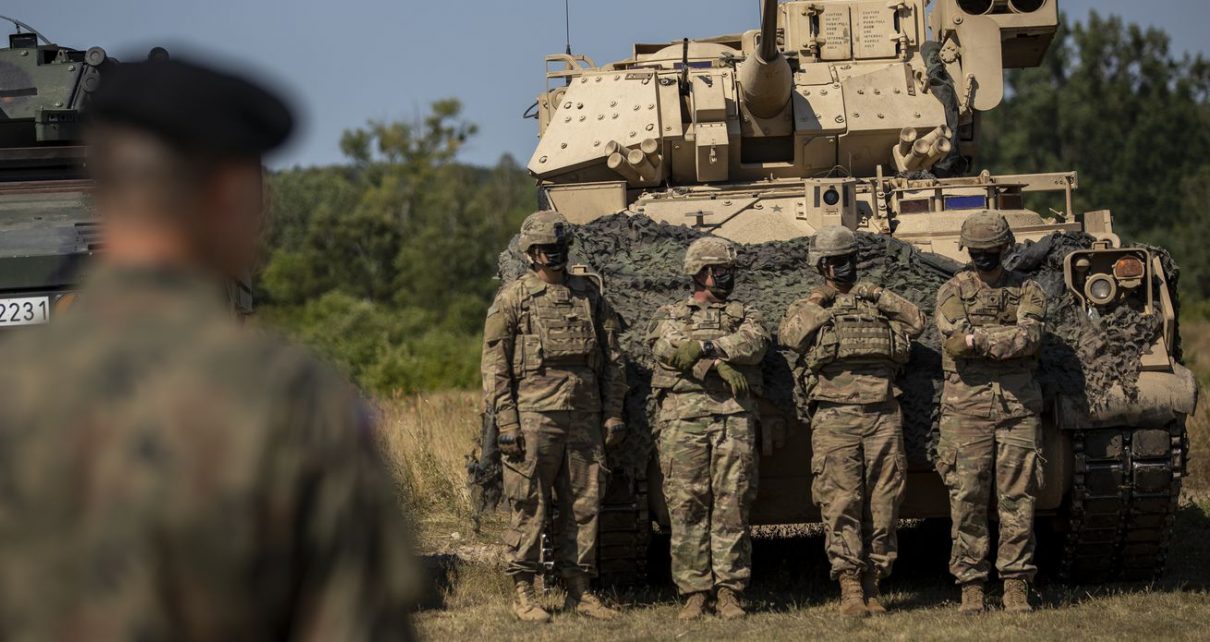
America’s dominance wasn’t by happenstance. It was a choice.
There’s a myth Americans tell themselves: After World War II, the United States had no choice but to be the world’s superpower and preeminent military force. No other countries were strong enough after years of fighting, and it was solely up to the US, by virtue of its position, to rebuild and reorder the world.
The reason that’s not true, says Stephen Wertheim, author of Tomorrow, the World: The Birth of US Global Supremacy, is because the US made a conscious decision to seek military dominance before World War II ended. Such a strategy, forged in the heat of battle, would help the US thwart totalitarian regimes — namely the Soviet Union in later years — while pursuing its own interests.
Wertheim argues the plan made some sense in the moment. After all, Nazi Germany was winning in Europe, and the US didn’t want to live in a world full of brutal dictatorships. But the problem is the US hasn’t shifted its strategy since — and it’s backfired greatly.
Instead of focusing on issues like climate change and pandemic disease, for example, the US has prioritized building and deploying a robust force that has made a plethora of unnecessary enemies. And despite some horrific outcomes like the Iraq War, the US refuses to rethink its game plan, even after the Cold War ended and as domestic appetite for adventurism dwindles.
“Far from contributing to American security, the plan of global military superiority has made America — and Americans — less safe,” Wertheim, who is the deputy director of research and policy at the Quincy Institute for Responsible Statecraft in Washington, DC, told me.
To better understand why Wertheim believes the US should focus less on military superiority, not more, I called him and asked him to expand on his argument in an interview. Our conversation, edited for length and clarity, follows.
Alex Ward
Your book makes the case that American leadership wasn’t preordained. It was a choice. Explain what that choice actually was.
Stephen Wertheim
I had a really basic question in mind: When was the choice made to install the United States as the dominant military power across the globe?
It is a consensus, an axiomatic view, that the United States, for its national security interests, needs to be the No. 1 military power in the world, and must have troops in bases in foreign countries to secure its own and global interests. That’s meant to nip any potential aggressors in the bud rather than wait for an attack, or to stop others from gaining dominance in their own regions.
It’s widely believed that this idea came about after World War II when the US was the only real global power left standing. But that’s not true. This idea of “primacy” was forged in the wake of the fall of France to Nazi Germany in 1940.
Alex Ward
Wait — US officials decided the country should strive to be the world’s dominant force before World War II ended?
Stephen Wertheim
That’s right.
By October 1940, just months after imagining that the United States might be confined to an area no larger than a “quarter-sphere” partway down Brazil, postwar planners arrived at a startling conclusion: The United States had to hold “unquestioned power” globally, protecting by force as much of the non-German world as possible.
In his instantly famous essay announcing the arrival of the “American Century” in February 1941 — 10 months before Pearl Harbor — the publishing mogul Henry Luce wrote: “The big, important point to be made here is simply that the complete opportunity of leadership is ours.”
/cdn.vox-cdn.com/uploads/chorus_asset/file/22172284/2716364.jpg) Picture Post/Getty Images
Picture Post/Getty ImagesLuce urged his fellow Americans to “accept wholeheartedly our duty and our opportunity as the most powerful and vital nation in the world and in consequence to exert upon the world the full impact of our influence, for such purposes as we see fit and by such means as we see fit.”
“As we see fit.” The America Firsters were not the only ones who put America first.
Alex Ward
Okay, I wanted to make sure I had that clear since that’s not usually the story Americans tell themselves.
Provocatively, your book is basically a lament of the idea that the US is the world’s foremost power, underwritten by its strong military. In your view, why shouldn’t the US be the world’s preeminent force? After all, it’s helped us get to this place of unprecedented strength.
Stephen Wertheim
Far from contributing to American security, the plan of global military superiority has made America — and Americans — less safe.
I have a great deal of sympathy for the architects of US military dominance. I think they faced difficult circumstances. How could I not sympathize with wanting to rid the Axis powers from the Earth and make sure nothing like that happened again? I have complete sympathy with that goal.
But since the collapse of the Soviet Union, the reason that brought forth US global supremacy has ceased to exist. There was an original argument for the United States shouldering the immense burdens of global military dominance: Without it, totalitarian powers would conquer much of the Earth. That would be terrible for the world, the thinking went, and it could be bad for the United States.
The problem, though, is the pursuit of military dominance since then has created a lot of enemies of the US that didn’t need to be enemies of the US. We’ve engaged in bad behavior ourselves and stimulated it in others.
I worry that — in a world where the foremost threats to the American people are pandemic disease and climate change — America will continue to define its biggest threats in military terms, even if they aren’t.
Alex Ward
Part of what undergirds that sentiment these days, though, was the notion that the US had arrived at a “unipolar moment” — the US was the unquestioned power and global leader with no clear rival. Implicit in what you’re saying is that that moment is truly and forever gone.
Stephen Wertheim
We’re never going to get the unipolar moment back. It was rightly called a moment at the time in the 1990s. But since then, the United States caused a lot of destruction and grief for itself and for others. I really worry about where this goes as the world gets more challenging.
Alex Ward
Some will read this interview or your book and conclude that what you’re really angry about is high defense budgets. But if I understand your argument correctly, you’re saying that the strategy envisioned before World War II ended may have had some logic then, but it has none now, especially since it’s had the unintended effect of weakening US national security.
Stephen Wertheim
Precisely. Look, I am going to make the hardest possible case for my position: World War II. If there was ever a good argument to be made for the best use of American military power, my God, it’s exactly what my book is about. I’m actually trying to focus us on what I think is the best argument in favor of American military hegemony.
/cdn.vox-cdn.com/uploads/chorus_asset/file/22172296/566464315.jpg) Universal History Archive/Universal Images Group via Getty Images
Universal History Archive/Universal Images Group via Getty ImagesAnd what I find in that history is that the roots of our current problems are bound up with the best thing we’ve ever done as a nation. I think that’s why we have this problem. I’m trying to understand why military dominance looked attractive to begin with.
But I think if those postwar planners — had they been around today or even in the 1990s — they would say, “Wait a minute.” They would’ve realized how fraught it is to take on a world-ordering role by force, akin to what we understood the British Empire had done in the previous century. After all, they worried to themselves that what they were planning contained a measure of imperialism in it. But at the time, they felt it was better than the alternative, and understandably so.
Alex Ward
You make a case that the focus on military superiority led the US to care less about other elements of power, namely economic well-being. That’s not to say America didn’t care about having lots of money and a strong economy — it did — but your point is that America’s actions have caused widespread harm at home and abroad.
Stephen Wertheim
Since 1991, I think almost everybody has lost out, aside from the major defense firms and some ruling elites. America’s strategy has been incredibly destructive for people throughout the greater Middle East, and of course, the Iraq War resulted in the deaths of hundreds of thousands of civilians.
And I don’t think the American people have won out, either. I think that we have gotten less safe and more fearful as a society as a result of constantly being told by leaders of both parties that the whole world is out to kill us and that that’s why we’ve got to go to war to kill them first.
Look, the argument that US military power contributed to world order was very real. The Bretton Woods system played an important role in stabilizing global capitalism. But since the 1970s, and especially the 1990s, I think it’s hard to argue that US military dominance somehow underpins everything else.
It’s very difficult to see how applying sanctions on dozens of countries and waging continual warfare in the greater Middle East somehow serves the general interest of capitalism. Maybe it serves the interests of particular firms, but not the system of capitalism.
Alex Ward
The US has clearly made some horrible, deadly mistakes. No one is denying that. How can you say confidently, though, that the world wouldn’t be worse if the US didn’t play such an active role?
Stephen Wertheim
It’s now been three decades since the Soviet Union collapsed. Why haven’t we been able to do everything we want to effectively? It turns out that the enemies are skeptical of working with us to address shared challenges.
Now, it’s true sometimes that the use of hard power can back up diplomacy and make other endeavors more effective. But we have so overshot the mark that it’s more often the case that military dominance gets in the way of the kinds of constructive engagements in the world that I think many people in Washington want to see.
What I’m opposed to, first and foremost, is military dominance as an end in itself. That’s what I think it has become in our own time, and I don’t think it began that way. That doesn’t prohibit the US from being a robust power: It’s going to be a great power and it’s going to have a strong military. We should absolutely be able to defend ourselves. I’m not even closing the door on things like humanitarian intervention, either.
What we have to ask, though, is if the US has used all this power wisely and judiciously. It’s clear that we haven’t, and it’s making all of us in America and around the world less safe. Just think of this: Roughly 80 percent of all US military interventions have occurred after 1991. Can we really say the millions at home and abroad have had their lives improved by that? I don’t think so.
/cdn.vox-cdn.com/uploads/chorus_asset/file/22172300/50612931.jpg) Sgt. Roman/US Army/The LIFE Picture Collection via Getty Images
Sgt. Roman/US Army/The LIFE Picture Collection via Getty ImagesAlex Ward
So if there’s a President Wertheim in the future, how do you change America’s approach to the world?
Stephen Wertheim
I certainly agree with those who would say you don’t undo things in a hurry. You have to act responsibly, but boldly. We do have to break the perpetual war logic of the war on terror. And strangely enough, we’re kind of coming as a society to that view already.
I’d lead a systematic policy of disentangling the US from regions where its interests are either not vital, as in the Middle East, or not really imperiled, like Europe. I absolutely believe in the capacity of Europeans to manage their own affairs. The United States does not need to be the protector of Europe.
Alex Ward
What about China? Would it be wise to wind down America’s military strength while it rises?
Stephen Wertheim
China is a difficult challenge, but I would try to set priorities and act on them. Climate change and pandemic disease are the issues where Chinese behavior is terribly important to the US. They’re threats the American people face where they live and work, and so I would really prioritize those issues and improve the relationship around tackling them. Those issues are not well served by the United States pursuing perpetual military dominance in the Indo-Pacific.
At the same time, I do think we have to be cautious in observing how China continues to rise and how it behaves. It has not had a record of territorial conquest with anything like the record of past US adversaries, like the Axis powers or the Soviet Union. That’s a good thing, though you wouldn’t know it from all the cries about China’s desire to dominate the world emanating from Washington, DC.
A President Wertheim — and please let your readers know I’m rolling my eyes as I say that — would recognize the US has an opportunity to cautiously retrench its position militarily in certain regions as it ramps up cooperation on the issues that really matter. I’d encourage allies and partners in the region to step up to counterbalance China. We still have time to allow that process to happen, and that’d be a good thing since it takes two great powers to make a great-power war.
Alex Ward
Do you really think retrenchment is likely in the near future?
Stephen Wertheim
No. What I am fearful of right now is that it’s almost impossible for many people in the foreign policy community to envision circumstances in which the United States could ever pull back from a region. I worry about the United States putting itself on the front lines of any potential conflict, which could mean a great-power war. We should avoid being in that situation in the first place if we possibly can.





